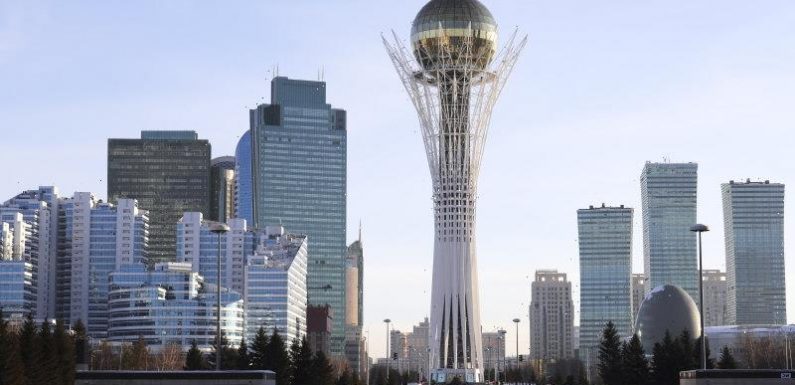
London: The President of Kazakhstan, the oil-rich former Soviet state nestled between authoritarian China and Russia, has vowed to strip himself of many of his powers and transfer them to parliament amid the fallout from January’s violent riots and attempted coup.
Kassym-Jomart Tokayev, who became president in 2019 after he was hand-picked by the country’s father of independence, dictator Nursultan Nazarbayev, has promised to make it easier for new political parties to register, overhaul the voting system to make the nation’s parliament more reflective of public sentiment and dilute the overwhelming powers of the president’s office.
Kazakhstan’s President Kassym-Jomart Tokayev and Russia’s Vladimir Putin shake hands after talks in the Kremlin in February. Tokayev requested help from Russian troops to quell the January protests.Credit:Kremlin/AP
About 230 people died, including 19 police officers, and more than 4000 were injured when violent protests against a New Year fuel price hike broke out in western Kazakhstan and snowballed into a nationwide movement demanding action against the government and Nazarbayev, a former president who still wields influence. Protesters set fire to the city hall and the presidential residence amid clashes with security forces.
Tokayev told parliament this week that the events were an “attempted coup” and a “conspiracy by high-ranking security officials” to overthrow the government with help of foreign-trained militants. It has not provided evidence of foreign interference.
In the sweeping reforms, which are yet to be given a timeline for implementation, Tokayev also promised to outlaw family members of presidents being appointed to positions of power within the government or public service.
That announcement has been seen as a direct swipe at Nazarbayev, who led the country in a dictatorship from 1991 until 2019, almost single-handedly making key business and political decisions for the past 30 years. His nephew was recently detained by Kazakhstan’s anti-corruption agency, which was investigating him for “abuse of power” and embezzlement of funds from Kazakhtelecom, the state-controlled telecommunications operator.
The burnt building of the city hall in Almaty, Kazakhstan, on January 13. President Kassym-Jomart Tokayev blamed the unrest on foreign-backed “terrorists” and requested assistance from the Collective Security Treaty Organisation, a Russia-led military alliance.Credit:AP
Nazarbayev was stripped of his role as head of the security council and local media has speculated that his supporters tried to use the protests as cover for a coup.
Human rights groups have claimed peaceful protesters were fired on with rubber bullets and tear gas, with some of those arrested tortured. Much of the violence took place under a nationwide internet and media blackout.
Almost 3000 criminal cases are under investigation by the internal affairs body, with 15 cases of high treason being investigated by nation security agencies.
A view of the centre of Nur-Sultan, the capital of Kazakhstan in January. The current President, although anointed by a strongman, is promising to make the country more democratic.Credit:AP
Under the promised reforms there would be a transition from a “super-presidential” form of government to a presidential republic with a “strong” parliament, he said.
“The system of management based on super-concentrated powers has ceased to be effective. It is unable to accommodate civil society with its many diverse views and convictions,” Tokayev said. “The rejection of excessive presidential powers will be an important factor that will ensure the irreversibility of political modernisation.”
In more than 30 amendments to the constitution and 20 new laws, Tokayev has promised an overhaul of the legal system, including increasing penalties for violence against women and children and expanding the categories of cases heard by jury trials beyond the most serious crimes.
The central Asian nation, mostly made up of mountains and arid steppe land, has a population of 19 million people. It rose to prominence for most of the Western world through the fictional television journalist Borat, created by comedian Sacha Baron Cohen in a 2006 mockumentary.
The country has some of the largest oil reserves in the world, producing 1.6 million barrels a day and has attracted billions of dollars in foreign investment. But the average income is less than $5000 a year.
The country has no popular opposition groups against the Kazakh government, the recent unrest appeared assembled directly by citizens.
Under the “New Kazakhstan” reforms, procedures to be registered as a political party with be simplified, with the threshold for members reduced from 20,000 to 5000 people. A constitutional court will also be established giving a right of appeal, and media laws will be overhauled to encourage a freer, independent and more competitive “mass media”.
Despite calling on Russian President Vladimir Putin’s military to shut down rioters earlier in the government has reassured Western nations it had not taken a side in the current conflict because it would be “choosing between brothers”.
Tokayev, who has offered to mediate between the warring nations, warned parliament about a threat of economic slowdown caused by international sanctions against its main trading partner, saying the country “faces unprecedented … financial and economic difficulties against the backdrop of the worsening geopolitical situation”.
Get a note directly from our foreign correspondents on what’s making headlines around the world. Sign up for the weekly What in the World newsletter here.
Most Viewed in World
From our partners
Source: Read Full Article


